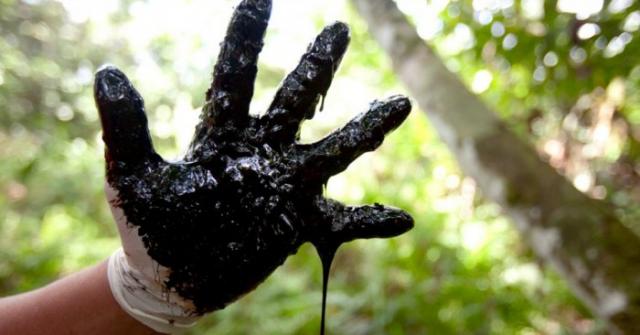Search
Recent comments
- sicko....
4 hours 3 min ago - brink...
4 hours 19 min ago - gigafactory.....
6 hours 5 min ago - military heat....
6 hours 48 min ago - arseholic....
11 hours 31 min ago - cruelty....
12 hours 48 min ago - japan's gas....
13 hours 28 min ago - peacemonger....
14 hours 25 min ago - see also:
23 hours 26 min ago - calculus....
23 hours 40 min ago
Democracy Links
Member's Off-site Blogs
we agree .....

Chevron's repeated refusal to clean up its toxic contamination of Ecuador's Amazon rainforest constitutes an "attack" on civilian populations and should be investigated by the International Criminal Court in the Hague, impacted indigenous and farming communities charged this week in a formal complaint (pdf) to the global body.
“In the context of international criminal law, the decisions made by Chevron’s CEO, John Watson, have deliberately maintained - and contributed to - the polluted environment in which the people of the Oriente region of Ecuador live and die every day,” states the complaint, which was submitted to the ICC's Chief Prosecutor Fatou Bensouda on Thursday on behalf of approximately 80 affected communities, totaling tens of thousands of people.
In 2011, impacted communities won a judgment in an Ecuadorian court against Texaco (acquired by Chevron in 2001) for its toxic waste dumping in the Lago Agrio region in northeastern Ecuador between 1964 and 1992, which created an ongoing environmental and public health crisis, including high cancer rates and reported birth defects among residents. Last year, Ecuador's National Court of Justice upheld the verdict but cut the initial mandated payment from $18 billion to $9.5 billion.
Chevron has repeatedly refused to pay the $9.5 billion ordered by Ecuadorian courts and even took the step of removing most of its assets from Ecuador in an apparent effort to avoid paying. Petitioners slam what they call "multiple collateral attacks against the judgment and the lawyers who represented the affected communities."
After years of legal battles, impacted peoples have not seen any reparations.
“The health conditions imposed on the indigenous and farmer communities that live in the Oriente constitute a serious and sustained attack on the population that has lived there peacefully for centuries,” states the ICC complaint. “The damages, which have been documented and confirmed in countless inspections conducted for the Ecuadorian case, brought various consequences, including water contamination, ground contamination, cancer, forced displacement, extermination of two ethnic groups, and many other disastrous conditions that are described in the annexes to this communication.”
The petition charges that the systemic harm inflicted by Chevron constitutes a "crime against humanity" and therefore is of concern to the international community.
"It is critical that all legal mechanisms be fully utilized to put an end to what is effectively impunity for a major American oil company that is committing human rights crimes against vulnerable populations," said Pablo Fajardo, lead lawyer for the impacted communities.
Indigenous Communities take Chevron to Global Court for 'Crimes against Humanity'
- By John Richardson at 27 Oct 2014 - 5:47pm
- John Richardson's blog
- Login or register to post comments
oil spills in mangroves...
Oil firm Royal Dutch Shell was told a pipeline had reached the end of its life years before it spilled up to 500,000 barrels of oil, according to court documents seen by the BBC.
Two spills in 2008 affected about 35 sq miles (90 sq km) in southern Nigeria, according to a group suing Shell.
The area included sensitive mangroves.
Shell "dismisses the suggestion that it has knowingly continued to use a pipeline that is not safe to operate," it told the BBC.
The emails, letters and internal reports submitted to a court in London show that senior Shell employees were concerned before the spill that Shell's pipelines in the area had reached the end of their lives and needed replacing to avoid danger to lives, the environment and the economy.
WaterThe spills took place in Bodo, a town in the Ogoniland region, where people interviewed for an Amnesty International report into the effects of the incident reported headaches and eyesight problems.
read more: http://www.bbc.com/news/business-29997074
bill for cleaning 120 km oil spill on the shore of lebanon...
The UN General Assembly has passed a resolution asking Israel to pay Lebanon more than $850m (£544m) for a major oil spill during Israel's 2006 war with Hezbollah.
The UN has asked Israel to compensate Lebanon before but this is the first time a figure has been given.
The assembly voted overwhelmingly in favour by 170 votes to six, but its resolutions are not legally binding.
Israel's UN mission said the resolution was biased.
The slick was created when Israeli jets bombed a power station, releasing about 15,000 tonnes of oil into the eastern Mediterranean sea.
At its peak, it stretched for 120km (75 miles) along the shore.
The resolution calls the incident an "environmental disaster'' which caused extensive pollution.
'Anti-Israeli agenda'The Lebanese ambassador to the UN, Nawaf Salam, said the resolution was "major progress".
http://www.bbc.com/news/world-middle-east-30559670